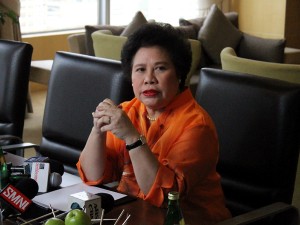Santiago: Scare China with ‘power politics’
MANILA, Philippines – Relying on the country’s western allies and member countries of the Association of Southeast Asian Nations (Asean) is the Philippines’ best recourse in its conflict with China, Senator Miriam Defensor-Santiago said on Thursday.
Santiago explained that since China has consistently refused to raise the issue on territorial dispute in the Scarborough Shoal (Panatag Shoal), which is in the West Philippine Sea (South China Sea), to international courts like the International Court of Justice and the United Nations Convention on the Law of the Sea, the only alternative left for the Philippines is “power politics.”
“What is left is power politics. [We] cannot engage them (China) in arms race. We must turn to our allies, the United States, Australia, which has pending VFA (visiting forces agreement) in the senate, South Korea, Singapore and ASEAN countries who also have interest in the South China Seas,” she said during the regular Kapihan sa Senado forum.
The Senate, before adjourning sine die, passed on second reading but with seven senators thumbing it down — including Santiago — the resolution on RP-Australia Status of Visiting Forces Agreement.
“The next five years between Philippine and China relations will be the flashpoint of the world,” Santiago said adding that US president Barack Obama’s earlier statement that their attention will shift from the middle east to Asia also had an impact on the situation.
According to Santiago, Filipino leaders must convince countries that have interest in the West Philippine Sea to not let China have sole mandate over the area. Santiago said that aside from being a potential source of oil and natural gas, the West Philippine Sea is the source of 10 percent of the total fisheries products and earns roughly $3.5 trillion annually. She added that half the world’s tonnage in shipping pass through these waters and it is a strategic international look-out point.
Santiago said that we should convince Philippine western allies and ASEAN co-members that they will lose freedom of navigation in the West Philippine Sea if China is allowed to claim the sea as part of its territory.
“It’s not the Philippine-American military treaty that will save us. It’s the outright scare that it (China) will not let pass any vessel [in the West Philippine Sea],” Santiago said.
She added that the Philippines lacked the resources to beef up its military forces to face China’s massive military force if the dispute would elevate to armed conflict.
“We have to use our wits. If you are lacking in physical attributes, you have to use your brains,” she added.
However, Santiago warned that the Philippines should not expect the United States to come to our aid in our dispute with China since the 1951 Mutual Defense Treaty is “irrelevant” in our row with one of the super powers in the world.
Santiago said that the 1951 treaty states that the US will only come to our defense if an attack is launched against the Philippines by a foreign country or when there is an attack in the Pacific area. Also, their aid will still be subject to the constitutional laws of their country, Santiago said.
She said that beefing up the Philippine Navy will not solve the conflict. Instead the government should focus more on improving the coast guard. Santiago said that China will be using only minimum power to assert its claim on the West Philippine Sea since launching an attack on the Philippines will trigger the execution of the 1951 treaty and the US will come to help the Philippines.
China, Santiago believes, will only deploy para-military vessels like patrol boats, and private fishing vessels to the Scarborough shoal or else Beijing will be accused of imposing “gunboat diplomacy.”
On the other hand, if the Philippine government continues to beef up the Navy, Santiago said Manila would risk being accused of militarism. Instead, the Philippines must modernize the equipment of the Philippine Coast Guard to improve the monitoring of Philippine seas, particularly the Scarborough Shoal.
For comprehensive coverage, in-depth analysis, visit our special page for West Philippine Sea updates. Stay informed with articles, videos, and expert opinions.
